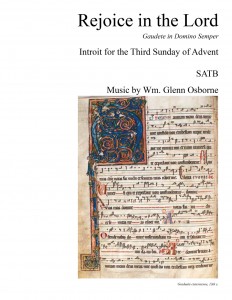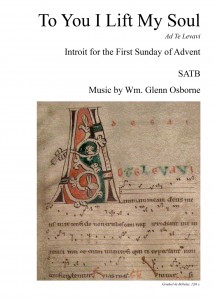arr. for SATB choir, strings and solo instrument
Tag Archives: SATB
Watch! Take care! Your hearts prepare!
Written for SATB Choir, unaccompanied, this piece is a setting of and Advent text by John Dalles based upon Mark 13:33-37. It will be premiered at the 2014 Christmas with the Basilica Choir Concert. Scores will be available for purchase after the premier.
Watchful Shepherd
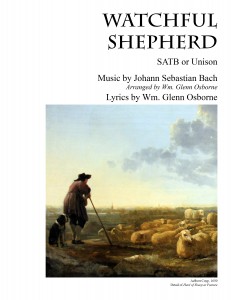 For Good Shepherd Sunday this year, I had programmed an arrangement of J.S. Bach’s “Schafe können sicher weiden” from Cantata 208 with an English text. At each of the choir rehearsals I had however, I became more and more frustrated with the part writing and the irregularity of the text. Finally, in a fit of frustration, I decided I would make my own arrangement and fix both the voice leading and text problems. While I considered trying for a translation of the original German, I opted instead to paraphrase Psalm 23. This is an easy anthem for the choir as they sing a simple four part harmonization of the chorale melody supported at all times by keyboard accompaniment. The piece could also be performed by a unison choir singing the soprano melody.
For Good Shepherd Sunday this year, I had programmed an arrangement of J.S. Bach’s “Schafe können sicher weiden” from Cantata 208 with an English text. At each of the choir rehearsals I had however, I became more and more frustrated with the part writing and the irregularity of the text. Finally, in a fit of frustration, I decided I would make my own arrangement and fix both the voice leading and text problems. While I considered trying for a translation of the original German, I opted instead to paraphrase Psalm 23. This is an easy anthem for the choir as they sing a simple four part harmonization of the chorale melody supported at all times by keyboard accompaniment. The piece could also be performed by a unison choir singing the soprano melody.
A performance by the Choir of the Cathedral of Mary Our Queen can be seen here.
To Love Is to Be Breakable
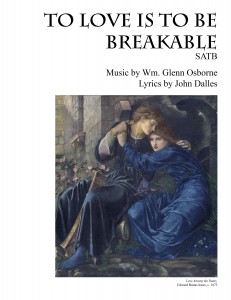 Composed at the request of Dr. Carl MaultsBy, Director of Music/Organist at St. Richard’s Episcopal Church in Winter Park for a service of Evensong in commemoration of C.S. Lewis at Knowles Chapel on the campus of Rollins College. The text is a paraphrase of C.S. Lewis by John Dalles. While the piece is written in an advanced tonal language dividing into SATB, most of the composition is in unison or two-part. The audio below was generated by the Finale music notation program so does not reflect the registrations indicated for the organ.
Composed at the request of Dr. Carl MaultsBy, Director of Music/Organist at St. Richard’s Episcopal Church in Winter Park for a service of Evensong in commemoration of C.S. Lewis at Knowles Chapel on the campus of Rollins College. The text is a paraphrase of C.S. Lewis by John Dalles. While the piece is written in an advanced tonal language dividing into SATB, most of the composition is in unison or two-part. The audio below was generated by the Finale music notation program so does not reflect the registrations indicated for the organ.
Basilica Choir Christmas CD
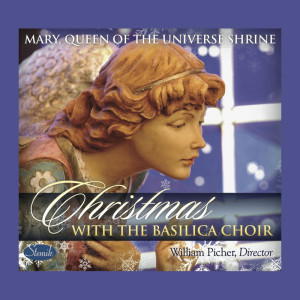 The CD is here! Order yours now for delivery before Christmas!
The CD is here! Order yours now for delivery before Christmas!
The Basilica Choir sings Christmas favorites and new carols on their newest CD on Stemik records including God, We Would Hear the Angels Sing.
Now available on iTunes as well.
The complete list of music follows:
- Joy to the World (Isaac Watts/Lowell Mason, after Handel, arr. William Picher)
- Hodie Christus Natus Est (Giovanni Pierluigi da Palestrina)
- Joseph Lieber, Joseph Mine (Michael Praetorius)
- It Came Upon the Midnight Clear (Edmund Sears/R.S. Willis, arr. William Picher)
- Blessed Be That Maid Marie (Trad. English 17th C., arr. Charles Wood)
- Rejoice in the Lord Always (Anon 16th C.)
- Gaudete (Anon. 16th c, arr. Brian Kay)
- God Rest You Merry, Gentlemen (Trad. English, 17th C., arr. William Picher)
- O Magnum Mysterium (Tomas Luis de Victoria)
- Ave Maris Stella (Trad. Russian, arr. Pavel Chesnokov, adapt. William Picher)
Morris Hudson, guest baritone soloist - Ding Dong Merrily on High (G.R. Woodward, arr. Carolyn Jennings)
- Es ist ein Ros (Michael Praetorius)
- God, We Would Hear the Angels Sing (John A. Dalles/Wm. Glenn Osborne)
- What Child is This (Trad. English, arr. John Stainer)
- The Boar
O Sons and Daughters
This is an arrangement of the Easter Hymn O Filii et Filiae for SATB choir, organ and brass quintet. It was originally written for the 25th anniversary of the episcopal ordination of Howard Hubbard as Bishop of the Diocese of Albany. The event was celebrated on the Second Sunday of Easter and needed a lengthy piece for the entrance procession. In addition to including all nine verses of the hymn there are interludes between each verse. This arrangement served as the basis for the later arrangement used at St. Patrick’s Cathedral for the Papal visit to New York City.
The score packet includes a full score, choral score, and parts for organ, horn, trumpet 1, trumpet 2, trombone 1, and trombone 2. Purchasers are granted permission to print or reprint scores as necessary for performance.
Salvator Mundi
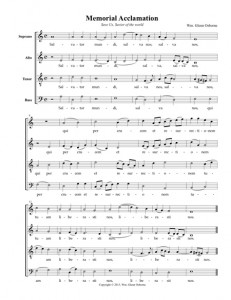 One of the difficulties in using a historical musical setting of the Latin Mass in the Novus Ordo is the lack of Memorial Acclamation and Amen. With only two syllables, it’s usually pretty easy to do some text replacement and derive an Amen from material in other movements. It may even be possible to simply use the amen found at the end of the Gloria or Credo as a stand alone Eucharistic acclamation. The Memorial Acclamation, regardless of the text option chosen, proves a much tougher challenge.
One of the difficulties in using a historical musical setting of the Latin Mass in the Novus Ordo is the lack of Memorial Acclamation and Amen. With only two syllables, it’s usually pretty easy to do some text replacement and derive an Amen from material in other movements. It may even be possible to simply use the amen found at the end of the Gloria or Credo as a stand alone Eucharistic acclamation. The Memorial Acclamation, regardless of the text option chosen, proves a much tougher challenge.
For the Choral Mass on February 22, 2013, at the Basilica of the National Shrine of Mary, Queen of the Universe, Dr. William Picher gave me the task of creating something for him to use alongside Palestrina’s Missa Papae Marcelli. While I initially wrote something for the SATTBB voicing that Palestrina uses, I forgot that this was to be a Latin Mass and set the English response “Save Us, Savior of the World.” Mea culpa. As six contrapuntal voices seemed a bit of a stretch for me in the limited time I had to prepare the piece, when I started over again with the equivalent Latin text, I opted for the more traditional (and perhaps more useful) SATB voicing.
I hope to have a recording of live singers performing the piece after February 22. In the meantime, the music notation program Finale has provided this rendering:
Salvator mundi, salva nos, qui per crucem et resurrectionem tuam liberasti nos.
Lord, by your cross and resurrection you have set us free. You are the Savior of the world.
Rejoice in the Lord
Gaudete in Domino semper:
iterum dico, gaudete.
Rejoice in the Lord always,
and again I say rejoice.
This musical setting of text from the introit for the third Sunday of Advent is written for unaccompanied SATB choir. The lyrics use both Latin and English phrases from the introit. The music alternates between short unison chant sections and longer polyphonic sections based on ideas found in the original Gregorian chant.
To You I Lift My Soul
Ad te levavi animam meam:
Deus meus in te confido.
Non erubescam.
To You, I lift up my soul.
I trust in you.
This musical setting of text from the introit for the first Sunday of Advent is written for unaccompanied SATB choir. The lyrics use both Latin and English phrases from the introit. The music alternates between short unison chant sections and longer polyphonic sections based on ideas found in the original Gregorian chant.
Dilexisti justitiam
You prize justice and abhor wickedness,
Therefore God, your God, has anointed you
With the oil of gladness, above your peers.
Dilexisti justitiam is the Introit for the Chrism Mass where the Sacred Oils are blessed every year during Holy Week. After experiencing the extremely lengthy entrance procession during my first Chrism Mass here in Orlando, I decided to write an extended musical setting of the introit that would lead easily into the hymn Lift High the Cross.
Scored for double choir, the composition may be performed with brass quartet playing the second choir. Hear a recording generated by Finale below.

